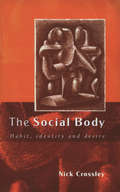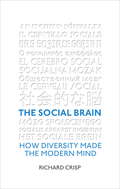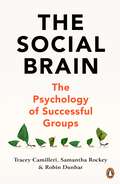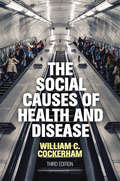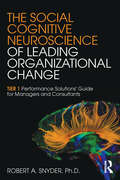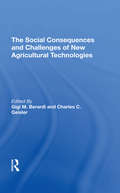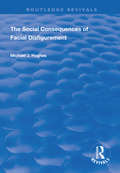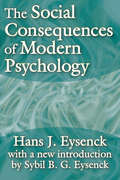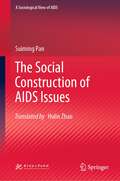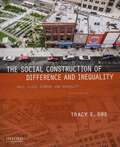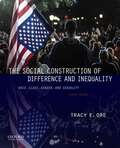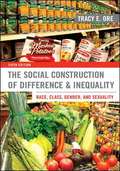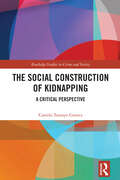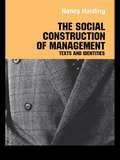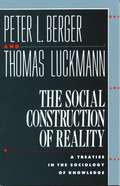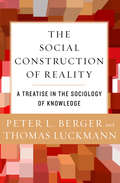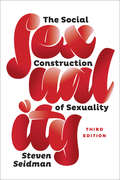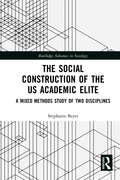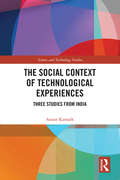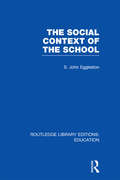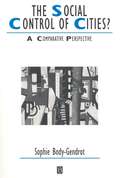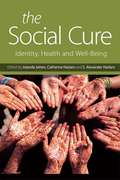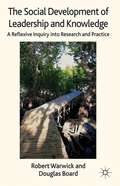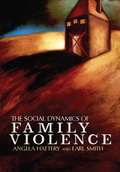- Table View
- List View
The Social Body: Habit, Identity and Desire
by Nick CrossleyThis book explores both the embodied nature of social life and the social nature of human bodily life. It provides an accessible review of the contemporary social science debates on the body, and develops a coherent new perspective. Nick Crossley critically reviews the literature on mind and body, and also on the body and society. He draws on theoretical insights from the work of Gilbert Ryle, Maurice Merleau-Ponty, George Herbert Mead and Pierre Bourdieu, and shows how the work of these writers overlaps in interesting and important ways which, when combined, provide the basis for a persuasive and robust account of human embodiment. The Social Body provides a timely review of the theoretical approaches to the sociology of the body. It offers new insights, and a coherent new perspective on the body.
The Social Brain: How Diversity Made The Modern Mind
by Richard CrispIs conflict caused by an inherently hostile human nature? Are efforts to promote peaceful co-existence fated to fail? Is the story of human history destined to play out a clash of civilizations?These are the questions framing contemporary debate over diversity, immigration and multiculturalism. The Social Brain provides an entirely new psychological perspective on this debate. It argues that diversity is critical to our very survival as a species; that contact with different cultures was, and is, the essential element that fuels our creativity, innovation and growth. It asserts that diversity was the key to our intellectual evolution and will be integral to helping us tackle the most pressing social, political and economic concerns of our time.The Social Brain ties the origins of the modern mind to the evolution of human society, and provides an entirely new insight into how we can harness the ingenuity and invention that reside within us all.
The Social Brain: The Psychology of Successful Groups
by Robin Dunbar Tracey Camilleri Samantha Rockey'A remarkable and important book . . . a highly accessible, timely and invaluable guide to anybody working in groups.' Prof Paul Gilbert OBE___________________________________________________How many people does the ideal team contain? How do groups bond, earn trust and forge shared identities? How can leaders build environments adaptable enough to respond to shocks and still enable people to thrive together? How can you feel close to people if your only point of contact is a phone or a computer?In The Social Brain leading experts from the worlds of evolutionary psychology and business management come together to offer a primer on great team working. They explain what size groups work and how to shape them according to the nature of the task at hand. They offer practical hints on how to diffuse tensions and encourage cooperation. And they demonstrate the vital importance of balancing unity and the need for different views and outlooks. By explaining precisely how the 'social brain' works, they show how human groups function and how to create great, high-performing teams._____________________________________'This wonderful book reminds us that businesses are also biological and social . . . It could not be more timely, wise and useful.' Margaret Heffernan, author of Wilful Blindness'Buy it for yourself and your colleagues. Essential reading.' Mark Earls, author of HERD
The Social Causes of Health and Disease
by William C. CockerhamThis stimulating book has become a go-to text for understanding the role that social factors play in the experience of health and many diseases. This extensively revised and updated third edition offers the most compelling case yet that stress, poverty, unhealthy lifestyles, and unpleasant living and working conditions can all be directly associated with illness. The book continues to build on the paradigm shift that has been emerging in twenty-first-century medical sociology, which looks beyond individual explanations for health and disease. As the field has headed toward a fundamentally different orientation, William Cockerham’s work has been at the forefront of these changes, and he here marshals evidence and theory for those seeking a clear and authoritative guide to the realities of the social determinants of health. Of particular note in the latest edition is new material on the relationship between gender and health, implications of the life course for health behavior, the health effects of social capital, and the emergence of COVID-19. This engaging introduction to social epidemiology will be indispensable reading for all students and scholars of medical sociology, especially those with the courage to confront the possibility that society really does make people sick.
The Social Cognitive Neuroscience of Leading Organizational Change: TiER1 Performance Solutions' Guide for Managers and Consultants
by Robert A. SnyderIn a very understandable, practical, and accessible manner, this book applies recent groundbreaking findings from behavioral neuroscience to the most complex and vexing challenges in organizations today. In particular, it addresses managing large-scale organizational changes, such as mergers and acquisitions, providing lessons and tactics that can be usefully applied to in many different settings. In addition to discussing successful practices, it also identifies the reasons that most past comprehensive, long-term change projects have failed and unmasks the counterproductive effects of the typical evolutionary or emotion-based attempts to change group and individual behavior, using neuroscience as its principal tool.
The Social Consequences And Challenges Of New Agricultural Technologies
by Gigi M Berardi Charles C GeislerAlthough formal social impact assessment of changing technologies in U.S. agriculture is still in its infancy, scholars have been documenting the effects of new technology throughout the twentieth century. In this collection, Prcfessors Berardi and Geisler bring together historically relevant research and a carefully chosen cross section of contemporary work. Their review of the literature is followed by an evaluation of the effects of mechanization on labor and production, written in 1904, which provides a backdrop for papers from the 1940s and 1950s examining the mechanization of agriculture in the South, in the Midwest, and in rural areas in general. Subsequent chapters offer present-day insights on such topics as the socioeconomic consequences of automated vegetable and tobacco harvesting, center-pivot irrigation, and organic and no-till cultivation. The authors also look at compensation and adjustment programs for displaced labor, the relationship between technology and agribusiness growth, and the effectiveness of university programs that prepare students to perform social impact assessments in agriculture. The edited proceedings of a spirited roundtable discussion on new directions for the study of the social impacts of farm technology and the political economy of agriculture provide the thought-provoking conclusion to this overview of the field.
The Social Consequences of Facial Disfigurement (Routledge Revivals)
by Michael J. HughesFirst published in 1998, this volume recognises that the face is important in human relationships and a facially impaired person is therefore disadvantaged. In this study the causes and social consequences of facial disfigurement are considered, the means whereby people adapt to revised appearance are explored, and an evaluation is made of professional help. Suggestions are given for improving the contribution of social work to rehabilitation.
The Social Consequences of Modern Psychology
by Hans EysenckIn The Social Consequences of Modern Psychology Eysenck takes the position that social science has real substance, and its findings ought to be applicable to social problems of our times. Although there is little that scientists can do about war and its prevention, or about social unrest and upheaval, or about strikes and other confrontations, there are a number of questions to which we can give tentative answers. This book deals with some of these questions, and finds some of the answers.Eysenck begins with a look at a paradox of modern psychology. Experimental psychologists use strictly scientific methods to investigate what to many people seem trivial and sterile problems, yet some social psychologists, psychiatrists and psychoanalysts investigate what are clearly important and socially relevant problems, but use methods and theories whose scientific rigor is doubtful at best. This paradox is artificial and unnecessary. Methods of investigation and theories and concepts enable us to combine worthwhile problems and rigorous methods.The book takes a long look at a particular problem which Eysenck investigated in depth during his illustrious lifetime. This tour de force, by one of the magisterial figures of modern psychology, is written for people as well as about people. It is not a rehash of the voluminous writings of lawyers, poets, politicians, dramatists, historians, psychiatrists and others who have felt compelled to write about these psychological matters without even a smattering of psychological knowledge. It is, instead, based on empirical investigations that are too often declared to be nonexistent by publicists and politicos.
The Social Construction of AIDS Issues (A Sociological View of AIDS)
by Suiming PanThis book explores AIDS from a relatively macro perspective rather than concrete operational methods and focuses on the social construction of AIDS issues instead of its transmission level in the context of China. First, it begins with the theoretical analysis and the social significance of AIDS, which is different from the simple conflict between different schools of thought. Second, it analyses the contest of various social powers in the process of AIDS construction and conclusion, rather than making different explanations of policies. Last but not least, it elaborates on the central proposition, i.e., the “AIDS issue” is a symbol of China’s social restructuring process. Only in an effort to advance such a process can we be more likely to find the best problem-solving mode, rather than clamouring repeatedly or giving countermeasures alone.
The Social Construction of Difference and Inequality: Race, Class, Gender, and Sexuality
by Tracy E. OreThe Social Construction of Difference and Inequality: Race, Class, Gender, and Sexuality, Seventh Edition, surveys how and why the categories of race, class, gender, and sexuality are constructed, maintained, experienced, and transformed. This popular anthology moves beyond simply discussing various forms of stratification and the impact on members of marginalized groups by providing a thorough discussion of how such systems of stratification are formed, perpetuated, and interconnected. Each reading ends with critical-thinking questions to help students relate content to their own lives and understand how their attitudes, actions, and perspectives may serve to perpetuate a stratified system.
The Social Construction of Difference and Inequality: Race, Class, Gender, and Sexuality
by Tracy E. OreThe Social Construction of Difference and Inequality: Race, Class, Gender, and Sexuality, Eighth Edition, surveys how and why the categories of race, class, gender, and sexuality are constructed, maintained, experienced, and transformed. This popular anthology moves beyond simply discussing various forms of stratification and the impact on members of marginalized groups by providing a thorough discussion of how such systems of stratification are formed, perpetuated, and interconnected. Each reading ends with critical-thinking questions to help students relate content to their own lives and understand how their attitudes, actions, and perspectives may serve to perpetuate a stratified system.
The Social Construction of Difference and Inequality: Race, Class, Gender, and Sexuality (Sixth Edition)
by Tracy OreThis best-selling anthology surveys how and why the categories of race, class, gender, and sexuality are constructed, maintained, experienced, and transformed. The Social Construction of Difference and Inequality then moves beyond simply discussing various forms of stratification and the impact of these on members of marginalized groups by providing a thorough discussion of how such systems of stratification are formed, perpetuated, and interconnected. Readers are then challenged at the end of each reading with critical thinking questions to relate content to their lives and understand how their own attitudes, actions, and perspectives may serve to perpetuate a stratified system.
The Social Construction of Disease: From Scrapie to Prion (Routledge Studies in the History of Science, Technology and Medicine #Vol. 25)
by Kiheung KimA historical exploration of scientific disputes on the causation of so-called ‘prion diseases’, this fascinating book covers diseases including Scrapie, Creutzfeldt-Jakob Disease (CJD) and Bovine Spongiform Encephalopathy (BSE). Firstly tracing the twentieth-century history of disease research and biomedicine, the text then focuses on the relations between scientific practice and wider social transformations, before finally building upon the sociologically informed methodological framework. Incisive and thought-provoking, The Social Construction of Disease provides a valuable contribution to that well-established tradition of social history of science, which refers primarily to the theoretical works of the sociology of scientific knowledge.
The Social Construction of Kidnapping: A Critical Perspective (Routledge Studies in Crime and Society)
by Camilo Tamayo GomezMoving beyond simplistic and sensationalist portrayals of kidnapping, this book offers a critical and interdisciplinary analysis that examines kidnapping as a social, historical, cultural, and political phenomenon.Kidnapping is a profound violation of human rights that reshapes societies, disrupts governance, and inflicts lasting trauma on individuals and communities. In Colombia, kidnapping became an endemic feature of the armed conflict, leaving tens of thousands of families in a perpetual state of uncertainty and fear. Through an innovative blend of criminology, sociology, transitional justice, surveillance studies, and collective memory epistemologies, this book unpacks kidnapping as a crime of (im)mobility, a strategy of war, and a serious human rights violation. Drawing on fifteen years of research, including statistical analysis, archival work, and interviews with former hostages, ex-combatants, and policymakers, it reveals how kidnapping shaped Colombia’s conflict and its ongoing efforts toward justice, truth, and reconciliation. By exploring its patterns, motivations, and legacies, this book not only sheds light on Colombia’s experience but also contributes to global discussions on transitional justice, collective memory, and the strategies societies adopt to confront mass victimisation.The Social Construction of Kidnapping is essential reading for scholars and students of criminology, transitional justice, human rights, political violence, and Latin American studies, as well as policymakers, human rights advocates, and anyone seeking a deeper understanding of how societies confront legacies of mass victimisation and forge paths toward accountability and healing.
The Social Construction of Management: Texts And Identities (Routledge Studies in Management, Organizations and Society)
by Nancy HardingWhat is management and how do the people who become managers take on a managerial identity?How does text inform the manager's identity?From cultural studies we understand that the relationship between text and reader is not passive but that each one works upon the other, and that text is active in forming the identity of the reader. This books is the first to analyse how many management textbooks construct their readers. It analyses management textbooks published since the 1950s and shows they construct a world in which chaos is kept at bay only by strong management, and in which strong management is based upon the rationality of modernity. This book exposes and analyses such claims-to-truths, and theorizes their arguments using the work of Butler and Foucault, the sociology of scientific knowledge, critical legal studies, art history and queer theory. By revealing a postmodern turn in management textbooks, The Social Construction of Management is both a critical and empirical study that explores the constitution of managerial identities in the age of mass education in management. An exciting contribution to the growing body of knowledge within critical management studies, this book challenges the way we think about organizations and their management, and about management education as a whole. This is thought provoking reading for anyone studying management, or working in the managerial organization.
The Social Construction of Reality
by Peter L. Berger Thomas LuckmannThe present volume is intended as a systematic, theoretical treatise in the sociology of knowledge.
The Social Construction of Reality: A Treatise in the Sociology of Knowledge
by Peter L. Berger Thomas LuckmannA watershed event in the field of sociology, this text introduced &“a major breakthrough in the sociology of knowledge and sociological theory generally&” (George Simpson, American Sociological Review). In this seminal book, Peter L. Berger and Thomas Luckmann examine how knowledge forms and how it is preserved and altered within a society. Unlike earlier theorists and philosophers, Berger and Luckmann go beyond intellectual history and focus on commonsense, everyday knowledge—the proverbs, morals, values, and beliefs shared among ordinary people. When first published in 1966, this systematic, theoretical treatise introduced the term social construction,effectively creating a new thought and transforming Western philosophy.
The Social Construction of Sexuality (Third Edition)
by Steven SeidmanIn The Social Construction of Sexuality, Steven Seidman investigates the political and social consequences of privileging certain sexual practices and identities while stigmatizing others. Addressing a range of topics from gay and lesbian identities to sex work, Seidman delves into issues of social control that inform popular beliefs and moral standards.
The Social Construction of the US Academic Elite: A Mixed Methods Study of Two Disciplines (Routledge Advances in Sociology)
by Stephanie BeyerThis book explores the stark stratification and struggles over classifications in US academia from a relational perspective, looking beyond material differences and tracing its roots to symbolic power relations. Based on a mixed methods study drawing on both interview and quantitative data, it offers an account of the workings of academia, shedding light on the structures that permit elite departments to define categories and impose legitimate scientific definitions, to which the non-elite must adhere. With a focus on two scientific disciplines, the author shows how the translation of objective structures into mental structures establishes a relationship of power with regard to the definition of scientific categories, thus determining access to resources and opportunities to participate and move within the academic field. A study of the unequal intrusion of economic logics into the academic domain, this volume will appeal to scholars, policy makers and institutional leaders with interests in higher education, inequality within science, academic careers, power relationships and competition in the academy.
The Social Context of Technological Experiences: Three Studies from India (Science and Technology Studies)
by Anant KamathThis book demonstrates how technology and society shape one another and that there are intrinsic connections between technological experiences and social relationships. It employs an array of theoretical concepts and methodological tools to examine the technology–society nexus among three urban groups in India (traditional caste-based handloom weavers, subaltern Dalit communities, and informal female labour). It provides evidence of how innovations such as industrial technologies, communication technologies, and workplace technologies are not only about strides in science and engineering but also about politics and sociology on the ground. The book contributes to the growing research in innovation studies and technology policy that establishes how technological processes and outcomes are contingent on complex sociological variables and contexts. The author offers an inclusive, holistic, and interdisciplinary approach to understanding the field of innovation and technological change and development by involving various methodologies (network analysis, archival work, oral histories, focus group discussions, interviews). The book will serve as reference for researchers and scholars in social sciences, especially those interested in development studies, science and technology policy and innovation studies, information and communication technology (ICT) policy, public policy, management, social work and research methods, economics, sociology, social exclusion and subaltern studies, women’s studies, and South Asian studies. It will also be useful to nongovernmental organisations, activists, and policymakers.
The Social Context of the School (Routledge Library Editions: Education)
by John EgglestonIn their appearance, schools often seem to be physically separated from their surroundings, cut off from the neighbouring houses and streets by high walls, by playgrounds or playing fields. Within the school, another world seems to exist, with a life of its own – its own routine, dress, rules and customs – which appears to have little relationship to the day-to-day life of the society outside. Yet despite these signs of separateness, we are becoming increasingly aware that a school’s surroundings, the local society in which it is set and whose children it educates, play an important part in determining what actually goes on in the classrooms and the playgrounds. This book looks at some of the factors in the local context of the schools and describes and analyses some of the often complex ways in which the schools interact with them.
The Social Control of Cities
by Sophie Body-GendrotIn this ground-breaking study, Sophie Body-Gendrot provides a comparative analysis of the growing problem of new forms of poverty and social marginalisation in contemporary advanced societies.
The Social Cure: Identity, Health and Well-Being
by Jolanda Jetten S. Alexander Haslam Catherine HaslamA growing body of research shows that social networks and identities have a profound impact on mental and physical health. With such mounting evidence of the importance of social relationships in protecting health, the challenge we face is explaining why this should be the case. What is it that social groups offer that appears to be just as beneficial as a daily dose of vitamin C or regular exercise? This edited book brings together the latest research on how group memberships, and the social identities associated with them, determine people’s health and well-being. The volume provides a variety of perspectives from clinical, social, organisational and applied fields that offer theoretical and empirical insights into these processes and their consequences. The contributions present a rich and novel analysis of core theoretical issues relating to the ways in which social identities, and factors associated with them (such as social support and a sense of community), can bolster individuals’ sense of self and contribute to physical and mental health. In this way it is shown how social identities constitute a ‘social cure’, capable of promoting adjustment, coping and well-being for individuals dealing with a range of illnesses, injuries, trauma and stressors. In addition, these theories provide a platform for practical strategies that can maintain and enhance well-being, particularly among vulnerable populations. Contributors to the book are at the forefront of these developments and the book’s strength derives from its analysis of factors that shape the health and well-being of a broad range of groups. It presents powerful insights which have important implications for health, clinical, social and organisational psychology and a range of cognate fields.
The Social Development of Leadership and Knowledge
by Robert Warwick Douglas BoardIn an increasingly complex and interconnected world, the authors make a case rich in theory and narrative for a new reflexive approach to real life situations. This approach (immersed reflexivity) draws on Pierre Bourdieu's logic of practice and the complexity sciences.
The Social Dynamics of Family Violence
by Angela Hattery Earl SmithHattery (sociology, George Mason U.) and Smith (sociology and American ethnic studies, Wake Forest U.) introduce sociology students to family violence in the US throughout the life cycle, with specific focus on its social character and institutional causes. They discuss physical and sexual child abuse, elder abuse, intimate partner violence, and violence in subgroups like gay and lesbian families and military families, and provide theoretical frameworks and methods used to study it. They address the role of social institutions and structures like the economy and religion and explore variations across family groups, including differences in race and ethnicity, social class, and sexuality, and prevention and avoidance strategies, and criminal justice, social service, and legal responses. Annotation ©2012 Book News, Inc. , Portland, OR (booknews.com)
